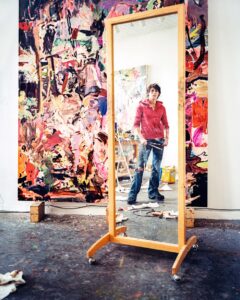In an era of rapid technological upheaval, Netflix’s recent earnings announcement didn’t just report quarterly performance—it fired a shot across the bow of the Hollywood status quo. The company revealed that The Eternaut, its newly produced Argentine sci-fi drama, is the first Netflix series to include entirely AI-generated shots. One such sequence, a building collapse in Buenos Aires, would have blown past the show’s production budget had it relied on traditional methods. Instead, AI stepped in—not as a gimmick, but as a pragmatic solution.
Netflix co-CEO Ted Sarandos described the use of artificial intelligence as an “incredible opportunity” to make filmmaking better, not just cheaper. The message was clear: AI isn’t coming; it’s already here, and Netflix is embracing it. The revelation arrives amid ongoing industry debates around the ethical and creative implications of machine-generated content in entertainment. Will bots replace writers? Can synthetic imagery match the emotional resonance of human performance? Is AI an enabler—or an existential threat?
The Eternaut, based on the revered 1950s graphic novel by Argentine writer Héctor Germán Oesterheld and artist Francisco Solano López, tells the tale of a mysterious snowfall that blankets Buenos Aires, killing anyone it touches. A group of survivors must navigate the deadly new landscape while uncovering secrets tied to the strange cosmic phenomenon. It’s a bold, politically-charged sci-fi narrative—a fitting testbed for technological boldness.The production required visual effects that would typically demand Hollywood-tier budgets: collapsing buildings, altered cityscapes, and apocalyptic weather events. Rather than spend millions on practical effects or outsourcing to VFX teams, Netflix’s Latin American production unit decided to experiment. A shot involving a crumbling building was generated entirely using AI-based visual tools, reportedly slashing costs while maintaining a high standard of visual fidelity.This wasn’t a deepfake, nor a gimmick-laden experiment. It was a case of AI stepping in where budgetary limitations might have otherwise forced narrative compromises. That makes The Eternaut a milestone—not just in Latin American streaming, but in the larger movement toward AI-enhanced storytelling.
The entertainment industry has been wrestling with the implications of AI for years. From fears over deepfake actors replacing living performers to concerns about large language models writing scripts, AI has ignited both excitement and dread. Last year’s WGA and SAG-AFTRA strikes saw unions demanding (and eventually winning) guardrails against AI replacing writers or digitally cloning actors without consent or compensation.Despite those concerns, studios have quietly—and sometimes loudly—embraced AI. Disney, Warner Bros., and Sony have all experimented with generative tools for pre-visualization, dubbing, and script analysis. Netflix, however, has positioned itself more openly as a tech company willing to adopt cutting-edge tools.In 2023, Netflix listed dozens of AI-related job openings, including a position in its Machine Learning Platform team offering up to $900,000 per year. The job description was frank: Netflix wanted to explore how AI could “create great content.” Whether that means story generation, post-production enhancements, or full-on synthetic content remains deliberately vague.With The Eternaut, Netflix has gone from speculation to implementation. And that has major ramifications.
One of the most controversial aspects of AI in filmmaking is its perceived threat to artistic integrity. Will cost-saving tools lead to a flood of uninspired, formulaic content? Or can AI augment creativity by handling time-consuming or budget-breaking tasks?Ted Sarandos insists it’s the latter. “AI represents an incredible opportunity to help creators make films and series better, not just cheaper,” he said. That’s an important framing. Netflix isn’t selling AI as a cost-cutting cudgel; it’s positioning it as a creative partner.In theory, AI tools can:
Allow indie directors to realize large-scale visions without blockbuster budgetsAccelerate post-production workflows like rotoscoping, scene rendering, or audio mixingHelp writers explore narrative options or structure complex storiesTranslate and dub content seamlessly across dozens of languages
Netflix has always straddled two worlds: entertainment and technology. While traditional studios had to bolt on digital capabilities, Netflix was born in Silicon Valley’s ecosystem. Its algorithmic recommendation engine is legendary. Its cloud infrastructure is among the most advanced in streaming. The company even pioneered automated dubbing and localization via AI, improving global access to foreign content.The company’s early embrace of AI tools aligns with its history. In this view, Netflix’s use of AI isn’t about devaluing creativity; it’s about optimizing a highly competitive, data-driven business. With subscriber growth plateauing and content costs skyrocketing, Netflix needs tools that make high-quality global programming scalable.By leveraging AI, Netflix can stretch production dollars further in non-U.S. markets like Argentina, South Korea, or Nigeria—places where talent is abundant, but resources are often more constrained.This could lead to a virtuous cycle: better local stories, global accessibility, and more creative risk-taking, all powered by tech.
Herein lies the sharpest edge of the AI debate: labor. If a bot can render a collapsing building or simulate crowd scenes, what happens to the hundreds of artists, modelers, and animators who might otherwise have worked on those shots?The fear isn’t unfounded. AI won’t replace all jobs in entertainment, but it will certainly change many of them. Pre-visualization artists may shift into AI tool supervisors. VFX teams might shrink or evolve into prompt engineers. Writers may be expected to co-write with machines. Even directors might begin relying on AI-generated mood boards or storyboards.The WGA and SAG-AFTRA contracts included provisions requiring consent for AI use, especially for synthetic likenesses or performances. But outside the U.S., protections are looser. In countries like Argentina or India, AI-generated content could rapidly scale with little regulatory pushback.Netflix’s use of AI on The Eternaut raises difficult questions about whether those displaced by AI will be retrained, compensated, or simply replaced.
Netflix’s crown jewel remains Squid Game—a Korean-language surprise hit that proved a global sensation could emerge from anywhere. The show, with its allegorical violence and tightly scripted intensity, felt wholly original—decidedly human.Could AI help create the next Squid Game? Perhaps not in story or tone, but certainly in infrastructure. AI could help scout cheaper locations, simulate dangerous stunts, and aid in international dubbing. If a future series from Brazil or Turkey needs a sweeping scene that’s out of budget, AI could bridge the gap—making global storytelling truly competitive with Hollywood-scale productions.This is the democratizing argument for AI in filmmaking: not replacement, but empowerment. A filmmaker with vision no longer needs a Marvel-sized budget to depict the end of the world. They just need an AI suite, a skilled prompt engineer, and Netflix’s backing.
While The Eternaut used AI for one building-collapse scene, more concerning trends loom on the horizon. AI tools can now clone voices, replicate faces, or simulate full performances. Several companies have already offered deceased actors in “new roles,” raising both legal and ethical alarms.Will Netflix avoid such practices? The company has been careful, so far, to distance itself from controversial use cases. But as competition intensifies, the pressure to cut costs or grab attention could increase.For now, AI in Netflix’s workflow is additive. But the line between enhancement and replacement is razor thin—and unregulated.Expect ongoing debates about:
Consent and compensation for synthetic actor clonesAttribution and copyright for AI-assisted scripts or artTransparency in labeling AI-generated content
The question isn’t whether AI will be used in filmmaking—it’s how, where, and to what extent. Netflix has chosen to lead that charge, framing AI as a tool of collaboration rather than replacement.Whether that’s true depends on implementation. If AI augments human storytelling—expanding what’s possible on screen without reducing the value of creative labor—it could be a breakthrough. But if it becomes a shortcut for soulless content churn, the industry could face a crisis of authenticity.The Eternaut may not be the next Squid Game, but it signals a shift: prestige streaming is now intertwined with intelligent machines. As studios weigh cost, ethics, and artistry, one thing is certain—AI will be part of the story.The bots are here. What matters now is how we choose to tell the tale.
No comments yet.







